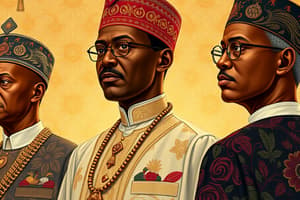Podcast
Questions and Answers
What type of system does the Nigerian government operate?
What type of system does the Nigerian government operate?
- Monarchical system
- Presidential system (correct)
- Theocratic system
- Parliamentary system
How many tiers of government exist in Nigeria?
How many tiers of government exist in Nigeria?
- Five tiers
- Four tiers
- Two tiers
- Three tiers (correct)
What is the head of state and government in Nigeria?
What is the head of state and government in Nigeria?
- Speaker of the House of Representatives
- Vice President
- Senate President
- President (correct)
What is the term of office for the President of Nigeria?
What is the term of office for the President of Nigeria?
What is the role of the Vice President in Nigeria?
What is the role of the Vice President in Nigeria?
What is the function of the National Assembly in Nigeria?
What is the function of the National Assembly in Nigeria?
How many local government areas exist in Nigeria?
How many local government areas exist in Nigeria?
What is the highest court in Nigeria?
What is the highest court in Nigeria?
Flashcards
Nigerian Government Structure
Nigerian Government Structure
Nigeria is a federal republic with a presidential system, divided into three tiers: federal, state, and local.
Federal Government Branches
Federal Government Branches
The federal government comprises the executive, legislative, and judicial branches.
Executive Branch (Federal)
Executive Branch (Federal)
Led by the President, who appoints ministers and makes key decisions.
Legislative Branch (Federal)
Legislative Branch (Federal)
Signup and view all the flashcards
Judicial Branch (Federal)
Judicial Branch (Federal)
Signup and view all the flashcards
State Government Structure
State Government Structure
Signup and view all the flashcards
Local Government Structure
Local Government Structure
Signup and view all the flashcards
Nigerian President
Nigerian President
Signup and view all the flashcards
Study Notes
Structure of the Nigerian Government
- Federal Republic with a Presidential system
- Three tiers of government: Federal, State, and Local
Federal Government
- Comprises the:
- Executive (President and Ministers)
- Legislative (National Assembly: Senate and House of Representatives)
- Judicial (Supreme Court and other federal courts)
- Head of State and Government: President
- Current President: Muhammadu Buhari (since 2015)
Executive Branch
- President:
- Elected by popular vote for a 4-year term
- Limited to two terms
- Appoints federal ministers and other high-ranking officials
- Vice President:
- Supports the President and assumes office if the President is incapacitated
- Federal Ministers:
- Responsible for various portfolios (e.g., finance, education, defense)
- Appointed by the President and confirmed by the Senate
Legislative Branch
- National Assembly:
- Bicameral legislature consisting of the Senate and House of Representatives
- Senate: 109 members, each representing a state, serving 4-year terms
- House of Representatives: 360 members, each representing a federal constituency, serving 4-year terms
- Powers:
- Lawmaking
- Budget approval
- Oversight of the Executive
Judicial Branch
- Supreme Court:
- Highest court in the land
- Interprets the Constitution and federal laws
- Other federal courts:
- Court of Appeal
- Federal High Court
- High Courts of the Federal Capital Territory
State Government
- 36 states and the Federal Capital Territory (FCT)
- Each state has:
- Executive (Governor and Deputy Governor)
- Legislative (State House of Assembly)
- Judicial (State High Court and other state courts)
Local Government
- 774 local government areas (LGAs)
- Each LGA has:
- Executive (Chairman and Vice Chairman)
- Legislative (Local Government Council)
- Administrative roles (e.g., provision of basic services)
Structure of the Nigerian Government
- Nigeria is a Federal Republic with a Presidential system
- The government has three tiers: Federal, State, and Local
Federal Government
- Comprises the Executive, Legislative, and Judicial branches
- Head of State and Government is the President
- The President is the head of the Executive branch
- Current President is Muhammadu Buhari, in office since 2015
Executive Branch
- The President is elected by popular vote for a 4-year term
- The President is limited to two terms
- The President appoints federal ministers and other high-ranking officials
- The Vice President supports the President and assumes office if the President is incapacitated
- Federal Ministers are responsible for various portfolios and are appointed by the President and confirmed by the Senate
Legislative Branch
- The National Assembly is a bicameral legislature consisting of the Senate and House of Representatives
- The Senate has 109 members, each representing a state, serving 4-year terms
- The House of Representatives has 360 members, each representing a federal constituency, serving 4-year terms
- The National Assembly has the power to make laws, approve the budget, and oversee the Executive
Judicial Branch
- The Supreme Court is the highest court in the land
- The Supreme Court interprets the Constitution and federal laws
- Other federal courts include the Court of Appeal, Federal High Court, and High Courts of the Federal Capital Territory
State Government
- Nigeria has 36 states and the Federal Capital Territory (FCT)
- Each state has an Executive, Legislative, and Judicial branch
- The Executive branch of a state is headed by the Governor and Deputy Governor
- The Legislative branch of a state is the State House of Assembly
- The Judicial branch of a state is the State High Court and other state courts
Local Government
- Nigeria has 774 local government areas (LGAs)
- Each LGA has an Executive, Legislative, and administrative roles
- The Executive branch of an LGA is headed by the Chairman and Vice Chairman
- The Legislative branch of an LGA is the Local Government Council
- The administrative roles of an LGA include the provision of basic services
Studying That Suits You
Use AI to generate personalized quizzes and flashcards to suit your learning preferences.




